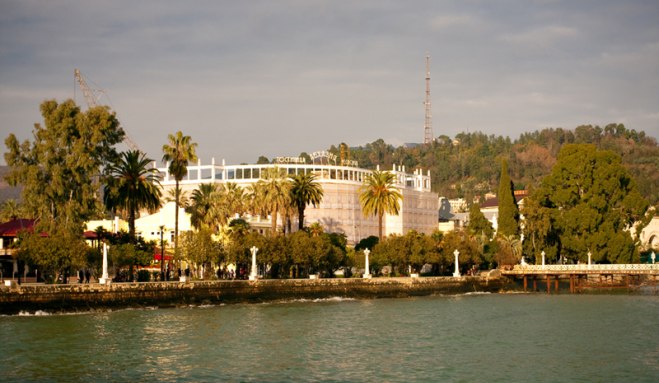International conference dedicated to Abkhazian scientist Khukhut Bgazhba’s 100th anniversary held in Sukhum

Sukhum, the capital of Abkhazia
SUKHUM -- An international scientific conference dedicated to the 100th anniversary of a scientist-abkhazialogist, linguist, literary critic, specialist in study of folklore, winner of D. Gulia award, D. Ph., Professor, academician of the Abkhazian Academy of Sciences Khukhut Bgazhba has opened in the capital of Abkhazia.
The conference has been organized by D. I. Gulia Abkhazian Institute for Humanitarian Studies (AIHS). Before the forum conferees had laid wreaths to the memorial to the First President Vladislav Ardzinba in the Glory Park.
The conference was opened by the director of D. Gulia Institute Vasily Avidzba.
Participants in the scientific forum on behalf of the people and leaders were welcomed by President Raul Hadzhimba.
He said that prominent scientists from Moscow, Kabardino-Balkaria, Stavropol Territory, Karachay-Cherkessia, Adygea, Chechnya, and Dagestan participated in the scientific forum.
‘I can proudly say that the research institutes well known for their achievements well beyond Abkhazia functioned and continue to function in our country. Those are such scientific research institutes as the Institute of Experimental Pathology and Therapy, the Institute of Botany, the Sukhum Institute of Applied Physics, the Institute of Balneology, the Institute of Agriculture and the Institute of Ecology that has been created recently’, Raul Hadzhimba said.
The President emphasized that D. I. Gulia Institute for Humanitarian Studies had a special place on this list.
‘The scientists who made a significant contribution to the studies of Abkhazia and Caucasus worked at different times in this famous institute. Hukhut Bgazhba, a widely recognized scientist and organizer of science, also belongs to them. His scientific activities are many-sided, but first of all he is a philologist in the broadest sense of this word’, the President said. He specified that, being quite young, Bgazhba had published ‘A short essay on the modern Abkhazian literature’, a monograph that became the first Abkhazian book of literary criticism.
Raul Khadzhimba mentioned Bgazhba’s significant contribution to linguistics. His linguistic works on grammar, lexicology, and dialectology of the Abkhazian language remain to be actual and a reference book for experts. Bgazhba did a lot for collecting and studying the Abkhazian folklore, at the same time he translated book from Russian into Abkhazian, and from Abkhazian into Russian.
The President gave an example that the Collection of Abkhazian fairy tales translated by Bgazhba had run through 8 editions.
‘Bgazhb gave back to the readers many works of the Abkhazian writers who had been reprised, the works which could be buried in oblivion. It’s natural that after the Academy of Sciences of Abkhazia has been created he was among the first scientists who were elected to the Academy’, the President said.
Raul Khadzhimba believes that for a younger generation of Abkhazian scientists Khukhut Bgazhba will be an example of professional attitude to what they do. ‘It has to study, in my opinion, all scientific and literary heritage for a modern reader to be able to receive a full body of Bgazhba’s works’, he said.
The President regretfully added that Abkhazian scientists had to work in difficult conditions with low salaries and weak logistical support of scientific institutions. ‘I cannot promise that the situation will suddenly change, but you will surely feel the changes. We are deeply indebted to our intellectuals and will use the best efforts for improving working conditions and life of Abkhazian scientists ‘, he said.
The President expressed gratitude to the guests who had arrived in Sukhum for participating in the conference and wished them fruitful work.
Raul Khadzhimba also said that he had signed an Executive Order awarding an academician of the Adyghe International Academy of Sciences Ruslan Mamiy a III degree ‘Akhdz-Apsha’ Order.
Ruslan Gilimovich thanked the President for the honor done and wished him every success.
After the plenary session conferees continued to work in sections: literary criticisms, linguistics, folklore studies.
Conference will end on October 16.